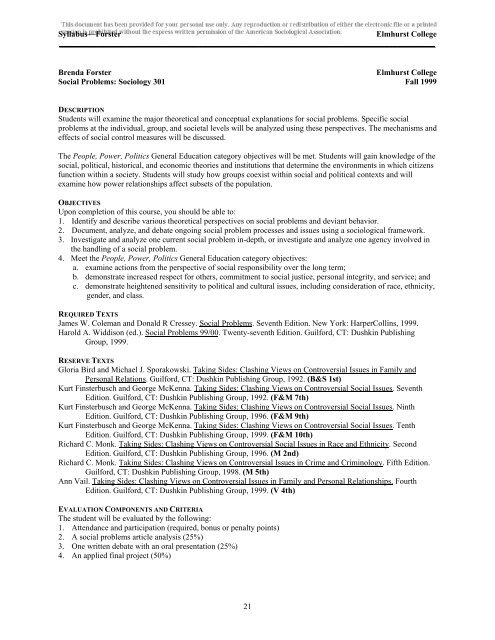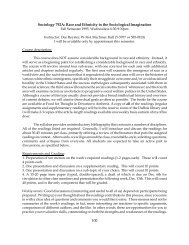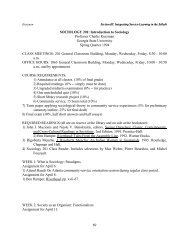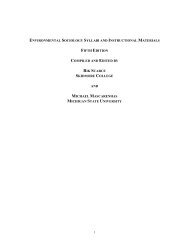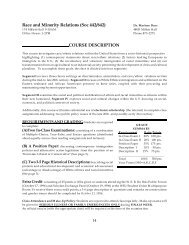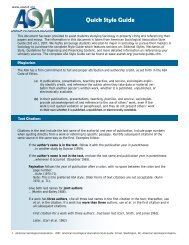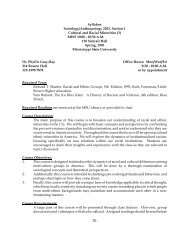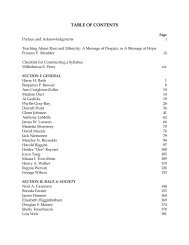Social Problems - American Sociological Association
Social Problems - American Sociological Association
Social Problems - American Sociological Association
Create successful ePaper yourself
Turn your PDF publications into a flip-book with our unique Google optimized e-Paper software.
Syllabus—Forster Elmhurst College<br />
_____________________________________________________________________________________________<br />
Brenda Forster Elmhurst College<br />
<strong>Social</strong> <strong>Problems</strong>: Sociology 301 Fall 1999<br />
DESCRIPTION<br />
Students will examine the major theoretical and conceptual explanations for social problems. Specific social<br />
problems at the individual, group, and societal levels will be analyzed using these perspectives. The mechanisms and<br />
effects of social control measures will be discussed.<br />
The People, Power, Politics General Education category objectives will be met. Students will gain knowledge of the<br />
social, political, historical, and economic theories and institutions that determine the environments in which citizens<br />
function within a society. Students will study how groups coexist within social and political contexts and will<br />
examine how power relationships affect subsets of the population.<br />
OBJECTIVES<br />
Upon completion of this course, you should be able to:<br />
1. Identify and describe various theoretical perspectives on social problems and deviant behavior.<br />
2. Document, analyze, and debate ongoing social problem processes and issues using a sociological framework.<br />
3. Investigate and analyze one current social problem in-depth, or investigate and analyze one agency involved in<br />
the handling of a social problem.<br />
4. Meet the People, Power, Politics General Education category objectives:<br />
a. examine actions from the perspective of social responsibility over the long term;<br />
b. demonstrate increased respect for others, commitment to social justice, personal integrity, and service; and<br />
c. demonstrate heightened sensitivity to political and cultural issues, including consideration of race, ethnicity,<br />
gender, and class.<br />
REQUIRED TEXTS<br />
James W. Coleman and Donald R Cressey. <strong>Social</strong> <strong>Problems</strong>. Seventh Edition. New York: HarperCollins, 1999.<br />
Harold A. Widdison (ed.). <strong>Social</strong> <strong>Problems</strong> 99/00. Twenty-seventh Edition. Guilford, CT: Dushkin Publishing<br />
Group, 1999.<br />
RESERVE TEXTS<br />
Gloria Bird and Michael J. Sporakowski. Taking Sides: Clashing Views on Controversial Issues in Family and<br />
Personal Relations. Guilford, CT: Dushkin Publishing Group, 1992. (B&S 1st)<br />
Kurt Finsterbusch and George McKenna. Taking Sides: Clashing Views on Controversial <strong>Social</strong> Issues. Seventh<br />
Edition. Guilford, CT: Dushkin Publishing Group, 1992. (F&M 7th)<br />
Kurt Finsterbusch and George McKenna. Taking Sides: Clashing Views on Controversial <strong>Social</strong> Issues. Ninth<br />
Edition. Guilford, CT: Dushkin Publishing Group, 1996. (F&M 9th)<br />
Kurt Finsterbusch and George McKenna. Taking Sides: Clashing Views on Controversial <strong>Social</strong> Issues. Tenth<br />
Edition. Guilford, CT: Dushkin Publishing Group, 1999. (F&M 10th)<br />
Richard C. Monk. Taking Sides: Clashing Views on Controversial <strong>Social</strong> Issues in Race and Ethnicity. Second<br />
Edition. Guilford, CT: Dushkin Publishing Group, 1996. (M 2nd)<br />
Richard C. Monk. Taking Sides: Clashing Views on Controversial Issues in Crime and Criminology. Fifth Edition.<br />
Guilford, CT: Dushkin Publishing Group, 1998. (M 5th)<br />
Ann Vail. Taking Sides: Clashing Views on Controversial Issues in Family and Personal Relationships. Fourth<br />
Edition. Guilford, CT: Dushkin Publishing Group, 1999. (V 4th)<br />
EVALUATION COMPONENTS AND CRITERIA<br />
The student will be evaluated by the following:<br />
1. Attendance and participation (required, bonus or penalty points)<br />
2. A social problems article analysis (25%)<br />
3. One written debate with an oral presentation (25%)<br />
4. An applied final project (50%)<br />
21


